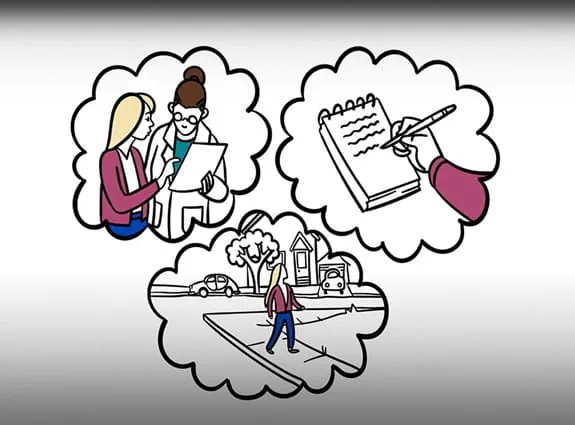Coping when you're first diagnosed with cancer
[The narrator appears on screen. She is a person with cancer.]
Narrator: The days and weeks after being diagnosed with cancer can be stressful and overwhelming. I know. I've been there.
[The narrator experiences a range of emotions. She covers her face in shock when she receives a cancer diagnosis from her doctor. She cries on her partner’s shoulder. She raises her fists in the air angrily. Finally, she has a blank face with bags under her eyes.]
Narrator: It's normal to be in shock or denial at first. I felt scared, sad and angry too. Some people just feel numb. There's no right or wrong way to feel. A mix of emotions will probably come and go.
[The narrator lies in bed, unable to sleep. Images appear above her head to show what she is thinking about. The first image shows her at work. The second shows her having cancer treatment and losing her hair. In the third image, she is playing with her kids. Then the scene changes to show her sitting with her chin in her hand as a clock beside her shows time passing.]
Narrator: Before starting treatment, I mostly felt helpless. I didn't know what to expect and I was worried about the future. Why couldn't treatment start right away? Having tests and waiting for results was frustrating. It felt like wasting time.
[The narrator sits in a waiting room with other people and looks up when her doctor opens the door. She talks with her doctor, who takes notes during their meeting. Then the doctor meets with another member of the healthcare team, looking through documents together as they make a plan.]
Narrator: Because every cancer is unique, everyone's treatment plan will be different. My doctors used the test results to create a plan just for me. Your doctors will do the same for you. They can also reassure you that the time spent on having tests, making a plan and scheduling your treatment should not affect how well the treatment works.
[The narrator is in the middle of the screen. Images of a laptop, pamphlets and a clinic or hospital appear around her, representing places to get information about cancer.]
Narrator: While waiting for treatment to begin, you might want to learn more about cancer. Ask your doctor where to find information that is right for you.
[The narrator is joined by a few family members and friends who put their hands on her shoulders supportively.]
Narrator: It can also help to share your feelings with family, friends and people who understand what you're going through.
[The narrator talks to her doctor, then writes in a journal and then takes a walk outside.]
Narrator: Asking questions about what to expect, expressing my feelings and taking brisk walks to relieve some stress helped me cope during this time. You might cope in different ways. You should know that help is available.
[The Canadian Cancer Society’s name, logo, phone number and website appear at the top of the screen. The Bank of Montreal (BMO) logo appears below as a proud sponsor of the Cancer Basics video series.]
Narrator: The Canadian Cancer Society has information you can trust and can help you find support close to home. Visit cancer.ca or call us at 1-888-939-3333.

